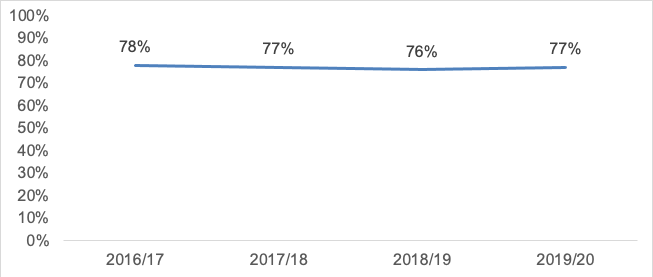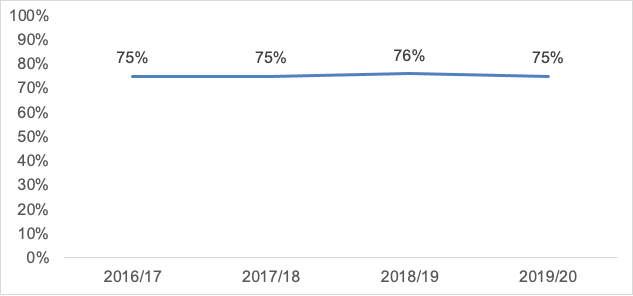Vision for Justice in Scotland: measurement framework
Measurement framework to support the delivery of the Vision for Justice in Scotland.
We have effective, modern person-centred and trauma-informed approaches to justice in which everyone can have trust, including as victims, those accused of crimes and as individuals in civil disputes
Increase everyone’s confidence in our justice services


72% of adults were either very or fairly confident that the justice system makes fair, impartial decisions based on the evidence in 2019/20, unchanged since 2016/17, while 61% of adults in 2019/20 were either very or fairly confident that the justice system is effective in bringing people who commit crimes to justice, again unchanged since 2016/17.
Due to the restrictions put in place during the COVID-19 pandemic, no survey was run during the 2020/21 financial year. The 2021/22 SCJS will be published at the end of November 2023. This data is expected to be produced annually.
Source: Scottish Crime and Justice Survey 2019/20
We all have confidence in reporting crimes

The SCJS estimates that the police became aware of 40% of crime in 2019/20, a similar proportion to previous years.
Due to the restrictions put in place during the COVID-19 pandemic, no survey was run during the 2020/21 financial year. The 2021/22 SCJS will be published at the end of November 2023. This data is expected to be produced annually.
Source: Scottish Crime and Justice Survey 2019/20

The majority of adults (55%) said the police in their local area do an excellent or good job. This figure has been stable in the last few years.
Due to the restrictions put in place during the COVID-19 pandemic, no survey was run during the 2020/21 financial year. The 2021/22 SCJS will be published at the end of November 2023. This data is expected to be produced annually.
Source: Scottish Crime and Justice Survey 2019/20
People in contact with the justice system must be supported to understand the processes of justice, be treated as a person first, experience joined up services and timely communication

75% of adults were either very or fairly confident that the justice system makes sure that everyone has access to the justice system if they need it, unchanged since 2016/17.
Due to the restrictions put in place during the COVID-19 pandemic, no survey was run during the 2020/21 financial year. The 2021/22 SCJS will be published at the end of November 2023. This data is expected to be produced annually.
Source: Scottish Crime and Justice Survey 2019/20
We have fairer access to justice

67% of adults were either very or fairly confident that the justice system allows all victims of crime to seek justice regardless of who they are, unchanged since 2016/17.
Due to the restrictions put in place during the COVID-19 pandemic, no survey was run during the 2020/21 financial year. The 2021/22 SCJS will be published at the end of November 2023. This data is expected to be produced annually.
Source: Scottish Crime and Justice Survey 2019/20
We have access to different forms of justice including non-legal solutions

Diversion from prosecution schemes have been in existence in Scotland since the early 1980s. They aim to provide support and advice in relation to the underlying causes of offending, such as substance use. In the late 1990s, the Scottish Office provided funding for some pilot schemes, which it rolled out across Scotland in 2000. Historically, diversion involves relatively low volumes compared to other fiscal disposals such as fines and warnings, or court proceedings.
The source of this data is Justice Social Work statistics. This data is limited to information that is provided and collected from justice social work management systems. The number of assessments undertaken, cases commenced, and cases successfully completed is from a justice social work perspective.
It should be noted that decisions in relation to when to offer referral for diversion from prosecution are made by prosecutors within COPFS, acting independently and in the public interest.
This indicator is from the Community Justice Performance Framework. For more information on the indicator, source, and notes on interpretation see the Community Justice Performance Framework – Guidance and Technical Notes.
Source: Scottish Government: National Statistics Justice Social Work Statistics – additional tables
We have more inclusive justice services and organisations which reflect our diverse communities

This figure shows the proportion of staff who identify as minority ethnic (excluding white minority ethnic) across organisations, and the varying and sometimes high levels where ethnicity is not known. The figure presents a simplified workforce composition by ethnicity for justice organisations and for solicitors who are members the Law Society of Scotland. The categories used by organisations to report on ethnicity differ. In order to more readily compare across organisations, data is presented here in three broad high level categories: White (including white minority ethnic), Minority Ethnic (excluding white minority ethnic) and Not Known.
Source: Ethnicity in the justice system: evidence review
We must ensure across criminal and civil jurisdictions that we experience fewer delays in the justice system

In 2022/23, the median time from offence to verdict for accused in all crime groups was 35 months in High Court, 17 months in Sheriff solemn court, 10 months in Sheriff summary court and 10 months in the Justice of the Peace court.
New statistics published presents new information on the time taken from offence date to verdict for persons accused of criminal charges. Figures are based on data supplied by SCTS. Datasets consists of management information derived from live operational databases and as such may be subject to minor changes over time.
Source: Journey times in the Scottish Criminal Justice System: 2022 to 2023 - gov.scot (www.gov.scot)
Everyone’s rights are upheld and we have the appropriate support needed to participate in justice processes

In 2019/20, 77% of adults were either very or fairly confident that the justice system allows all those accused of crimes to get a fair trial regardless of who they are, unchanged since 2016/17.

72% were confident that the justice system makes fair, impartial decisions based on the evidence available, unchanged since 2016/17.

75% were confident that the justice system makes sure everyone has access to the justice system if they need it, unchanged since 2016/17.
Source: Scottish Crime and Justice Survey 2019/20
Services are joined up and everyone is kept informed and we can all access the appropriate support needed to participate in justice processes

58% of victims in 2019/20 indicated they would have liked to receive more information.
Due to the restrictions put in place during the COVID-19 pandemic, no survey was run during the 2020/21 financial year. The 2021/22 SCJS will be published at the end of November 2023. This data is expected to be produced annually.
Source: Scottish Crime and Justice Survey 2019/20
We all can access a fair, modern, affordable civil justice system

Of those saying they had a civil law problem in 2019/20, just under two-fifths of adults (39%) had solved the problem, while just over a third (34%) were still trying to solve it. 17% had tried to solve the problem but had to give up and 9% were not planning to do anything about it.
Due to the restrictions put in place during the COVID-19 pandemic, no survey was run during the 2020/21 financial year. The 2021/22 SCJS will be published at the end of November 2023. The current questions on civil law problems were not included in the 2023/24 sweep as new measures of fraud and computer misuse were added in to the questionnaire and there was a need to maintain the overall survey length so as not to overburden respondents. Analysts will continue to review the questionnaire for future years and, as part of this work, will consider how best to measure this outcome going forward.
Source: Scottish Crime and Justice Survey 2019/20
Everyone is supported to recover from the harm and trauma and possible re-traumatisation they have experienced

In 2019/20, 54% of adults were either very or fairly confident that the justice system provides victims of crime with the services and support they need, unchanged since 2016/17.
Due to the restrictions put in place during the COVID-19 pandemic, no survey was run during the 2020/21 financial year. The 2021/22 SCJS will be published at the end of November 2023. This data is expected to be produced annually.
Contact
Email: Justice_analysts@gov.scot
There is a problem
Thanks for your feedback